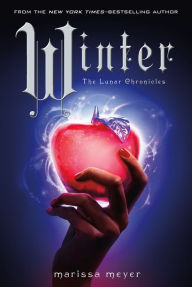 After how much I enjoyed Cress, the third installment in the Lunar Chronicles, I had high hopes going into the series’ final installment, Winter, but was also a little worried because—with the exception of Harry Potter and The Hunger Games—the ending of a young adult series like this is usually a bit of a let down and not just because it’s over. I’ve enjoyed a few in the last several years that have so much promise, build wonderfully, but end the series by falling flat in execution or become overly convoluted in an attempt to wring every last bit of drama out of them that can be had. Winter doesn’t do that; it’s longer than those that came before it but it delivers where and when it counts.
After how much I enjoyed Cress, the third installment in the Lunar Chronicles, I had high hopes going into the series’ final installment, Winter, but was also a little worried because—with the exception of Harry Potter and The Hunger Games—the ending of a young adult series like this is usually a bit of a let down and not just because it’s over. I’ve enjoyed a few in the last several years that have so much promise, build wonderfully, but end the series by falling flat in execution or become overly convoluted in an attempt to wring every last bit of drama out of them that can be had. Winter doesn’t do that; it’s longer than those that came before it but it delivers where and when it counts.
As the novel starts, Cinder—the lost Lunar princess and rightful ruler, Selene—and the friends she has gathered with her on the Rampion are hammering out the details of their plan to start a revolution on Luna and remove her aunt, Queen Levana, from power. With Emperor Kaito’s cooperation, they are able to get themselves onto Luna where they intend to rouse the citizens from the moon-nation’s outer—and severely oppressed—districts to rise up and march on the palace where their numbers should overwhelm the capabilities of those in charge. At the same time, Levana’s stepdaughter, Princess Winter, is still watching out for the abducted Scarlet—but Levana is growing increasingly jealous of the people’s affection for Winter and the threats posed by Cinder are frustrating her in ways she hasn’t felt for years.
There are so many characters and they go in so many different directions that it can be a bit tricky to keep track of everyone but ultimately the changes in perspective and the different ways the characters are paired up for the steps along the way work beautifully and keep the pacing exciting. The Lunar Chronicles as a whole act to emphasize exactly how important and engaging it can be to have switching points of view. None of the characters are presented in first person—a pet peeve of mine when it comes to young adult fiction—and they all have distinct personalities and ways of looking at and coping with the obstacles they encounter making the characters’ collective ability to work together that much more impressive. Meyer’s approach to add the characters and their stories gradually—one in each installment of the series as their role became clearer—was a wonderful way of building those voices and narratives (a way I know I didn’t appreciate much in Scarlet, though it might have been because the adjustment was jarring but also might just be that Scarlet is not my favorite character in the series).
Once again, I’m amazed at how well Meyer was able to weave the details of the fairy tales that inspire these characters into the novels as a whole. There have been a lot of series in the last decade or so that have used novellas or short stories as a way to provide additional insight into supporting or secondary characters—usually because the main book/series is limited by first person narration. I haven’t found those supporting stories too compelling in the past, but the Lunar Chronicles’ novella giving Levana’s history and rise to power in Fairest was worth it. Seeing the progression as she matures and learns not just how best to manipulate those around her but how to justify her actions to herself is a psychological masterpiece that is very valuable going into Winter where the reader sees just how different the responses to similar trauma can be.
Lastly, after being disappointed with the world building of the Selection series last week, the depth of it in the Lunar Chronicles is astounding. More than just the political institutions and their political figures as well as the geography of both a futuristic Earth and colonized, independent moon nation, the extent to which the social issues of this fictional society speak to current conversations is remarkable—the ethics of medical experimentation, the use of biological weapons, what constitutes and defines personhood, issues of class and wealth disparities, the use of propaganda, and more all appear throughout the series. And it is the characters’ opinions on such issues that help give them personality and depth, allowing their individual experiences to inform how they react to situations in ways which readers can easily relate to and apply to everyday life.